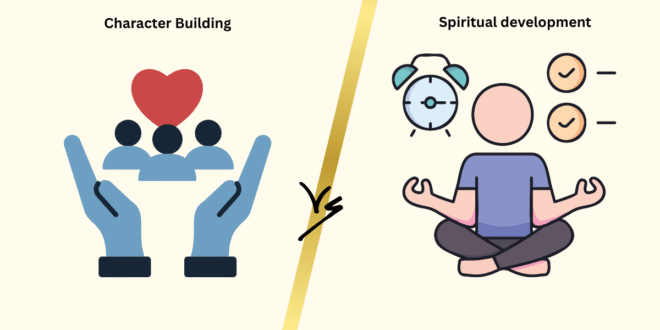In the journey of human growth, especially from the vantage of Islamic pedagogy and modern personal development, two terms frequently emerge: spiritual development and character development.
While they are deeply connected, they are not identical. Understanding the difference, the overlap, and how to cultivate both is essential for parents, educators, and individuals who aim for holistic Tarbiyah.
For readers of Edutarbiyah.com, and the Tarbiyah parenting practitioner course audience, this article serves as a practical roadmap: what each entail, why both matter, and how you can guide children (and yourself) to grow inwardly and outwardly.
Definition of the Terms.
Spiritual Development refers to the growth of the inner life of a person, their relationship with Allah (SWT), the state of their heart (qalb), consciousness (taqwa), worship (‘ibādah), and the meaning & purpose of life beyond the material.
It is about who you are before Allah and how you perceive your role in this world and the next.
Character Development or another words moral/ethical development refers to the refinement of a person’s behavior, attitudes, interactions with others, decision-making, and how they live morally in society.
It is about how you behave with people, how you translate beliefs into action, and how your inner state shows up outwardly.
Why Both Matter – And Why They Are Not Enough by Themselves
Why Spiritual Development Matters
- Without spiritual awareness, a person may have very good outward conduct but lack inner sincerity, purpose or connection with Allah. Spiritual development gives life purpose, anchors the heart, and helps cope with trials.
- Spiritual development fosters Taqwa, God-consciousness, which is foundational in Islam. Circularly, taqwa helps a person make moral choices, resist lower impulses (nafs) and strive for excellence (ihsān).
- For children and youth especially, spiritual grounding provides identity, meaning and resilience in an age of social media, distractions, and materialism.
Why Character Development Matters
- Good character is the visible fruit of faith and spirituality. The Prophet ﷺ is described as: And indeed, you are of a great moral character.” (Quran 68:4) So akhlaq is central.
- In society, ethical conduct, responsibility, respect, kindness, justice and integrity build trust, community, and positive relationships.
- For children and learners, focusing on character ensures faith is not just theoretical but practical and influential in their daily life, school, home, and in friendships.
Why You Need Both – And Why One Without the Other Is Incomplete
- If you only focus on spiritual development but neglect character, you might have inward faith but little outward transformation, risking hypocrisy.
- If you only focus on character, manners, behaviour, but without spiritual foundation, you might become ethical in a superficial way but lack depth, purpose and connection to Allah.
- The holistic Islamic model emphasizes tazkiyah (purification of the heart) which links the inner (spiritual) and outer (moral) aspects. Research shows that spiritual ethics significantly contribute to human personality development. (Econ Journals)
Key Differences At A Glance
| Aspect | Spiritual Development | Character Development |
| Focus | Relationship with Allah, heart awareness, meaning, worship, soul | Behavior, manners, ethics, interaction with others, responsibility |
| Internal vs External | Primarily internal (qalb, ruh, nafs) | Primarily external (actions, conduct) |
| Outcome | Taqwa, sincerity, inner peace, purpose | Integrity, kindness, respect, accountability |
| Example in children | Learning to pray with presence, understanding purpose | Saying truthfully “I am sorry”, helping others, patience with peers |
| Risk if lacking | Ritualistic worship without inner life | Good manners but superficial faith or meaninglessness |
| Integration | Enables character to be rooted in faith | Enables spirituality to be lived out in real life |
Interconnection: How Spirituality Fuels Character – And Vice Versa
- A spiritually developed person sees their behaviour as important because they know they will answer to Allah. This awareness (taqwa) motivates good character.
- When children practice good character (honesty, kindness), they strengthen their iman and spirituality. Action deepens belief.
- The framework of husn-i-akhlaaq (beautiful character) sees character refinement as the means to spiritual growth and human flourishing. (DOAJ)
Practical Strategies for Parents & Educators
Here’s how you (as a parent, teacher, or tarbiyah consultant) can integrate spiritual and character development in daily life.
For Spiritual Development
- Encourage regular dhikr, Qur’an recitation and reflection. Build moments of stillness & connection.
- Teach children the meaning of worship and make it relatable: “When we pray, we speak to Allah SWT”.
- Foster tazkiyah (purification): simple discussions about the heart, intentions (Niya), purification of Nafs (lower-self).
- Use stories of the prophets, Companions and righteous servants to inspire — emphasizing purpose, sacrifice, closeness to Allah.
- Model spiritual life: your own habits speak louder than what you say. Children watch your connection, struggle, sincerity.
- Use the home environment: dhikr after salah, short reminders of Allah’s Mercy, gratitude discussions.
For Character Development
- Use specific character traits to target: honesty, patience, gratitude, respect, responsibility, kindness, forgiveness.
- Create teachable moments: when something happens, ask: “How could you show patience? How could you help?”
- Set small behavioral goals: e.g., “This week I will greet at home every time I enter a room.”
- Use praise and reinforcement: when you see sincere effort in manners, affirm it.
- Use correction lovingly: focus on behavior, not on “you are bad”. Help children understand that they have potential.
- Embed character in everyday life: chores, sibling relations, school tasks, digital habits (screen time, respect online).
- Let children participate in service or community work – it builds empathy, responsibility and character.
Synergising Both – A Daily Routine Example
- Begin the day with gratitude: family shares one thing they are thankful for (spiritual).
- After morning salah, have a 2-min talk: “Today let’s focus on honesty, if we make a mistake, we admit it.” (character)
- Before bed, review: “Did I remember Allah in the day? Did I show kindness to someone?” (inner + outer)
- Weekly: pick a virtue (e.g., patience). Read a story from Seerah, discuss how the Prophet ﷺ or a Companion showed it (spiritual) → now apply it in school/home (character).
- Involve parents and teachers: A consistent message helps: “In school you show respect; at home you show it; in your heart you remember Allah.”
Challenges and How to Overcome Them
In the Modern Age
- Social media, screen time, peer pressure distract children from inner reflection and dilute character.
- A secular emphasis on behavior may ignore spiritual root; a purely ritualistic faith may ignore real life ethics.
- Education systems often emphasize academic achievement over Tarbiyah (development of the person).
Specific Challenges for Parents & Educators
- Busy schedules: less time for reflection and meaningful communication.
- Children may mimic behaviour (phones, games) rather than internalize value.
- Cultural pressures: sometimes character development is reduced to “obedience”, while spiritual development is reduced to ritual only.
How to Overcome
- Build small rituals: even 5 minutes of family reflection is better than none.
- Make learning interactive: story-based, scenario-based tasks (you’re already preparing curriculum for children!).
- Align spiritual and character goals with academic and social life. For example: “You learn this in school; let’s connect it with faith: being truthful is an Ibadah too.”
- Collaborate with schools and teachers: ensure character and spiritual development are integrated.
- Use positive technology: apps, digital diaries, reminders for dhikr and manners.
FAQs: Addressing Common Questions
Q1: Can a child have strong character but weak spirituality?
Yes, it’s possible—they may behave well (honest, polite) but lack inner purpose, feel disconnected from Allah or be motivated by worldly rewards. That’s why spiritual anchoring is needed.
Q2: Is spiritual development only for adults or older children?
Not at all. Even young children can be taught basic awareness: gratitude, remembrance of Allah, understanding that they exist to worship Allah and serve others. The methods will differ (stories, games, role-play) but the principle applies.
Q3: Are character and spirituality separate programs?
It’s better to integrate them. Separate programs can lead to compartmentalization: “I behave at home, I pray in the masjid, but they don’t connect.” When integrated, the child sees: “My faith influences how I behave with my sibling.”
Q4: How do we measure progress in these domains?
- For spirituality: check → heart awareness, sincerity of worship, reflection, calmness, sense of purpose.
- For character: check → behaviour, relationships, responsibility, consistency of good manners, decision-making.
Use journals, family discussions, teacher feedback, self-assessment (for older children).
Q5: What about modern challenges (digital distractions, peer pressure)?
They make it more important. Spiritual grounding helps children Centre themselves; character training helps them navigate peer situations with integrity. Use digital literacy, set boundaries, and model moderation.
Conclusion
The journey of human development in an Islamic worldview is holistic: it doesn’t separate the soul from behaviour; it doesn’t place faith in one corner and ethics in another. For parents, educators and tarbiyah coaches, the goal is to raise children who say their prayers with sincerity, reflect on their purpose, but also exhibit kindness, honesty, resilience and respect in their day-to-day.
May Allah (SWT) grant us success in combining tazkiyah (purification), tarbiyah (education/upbringing) and akhlaq (character) so that we raise children of substance, not just students of success.
 Edutarbiyah English Blog of Parenting and Tarbiyah
Edutarbiyah English Blog of Parenting and Tarbiyah



